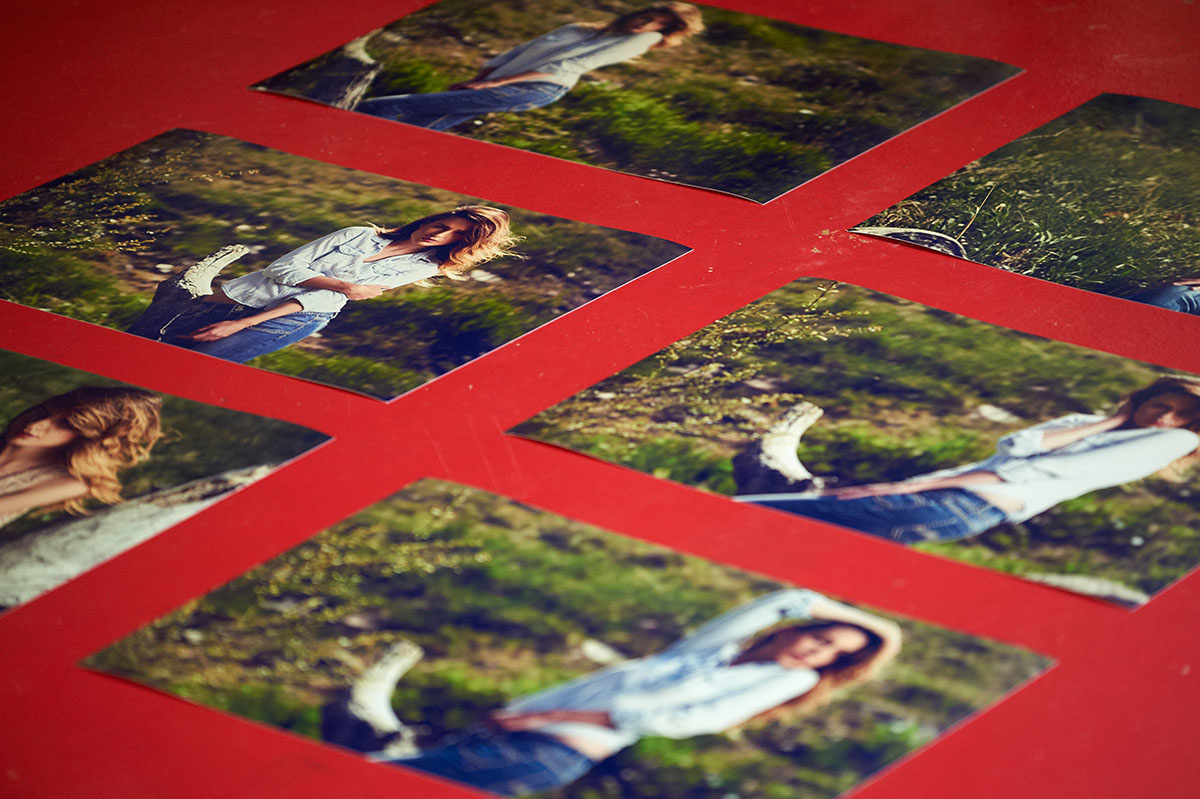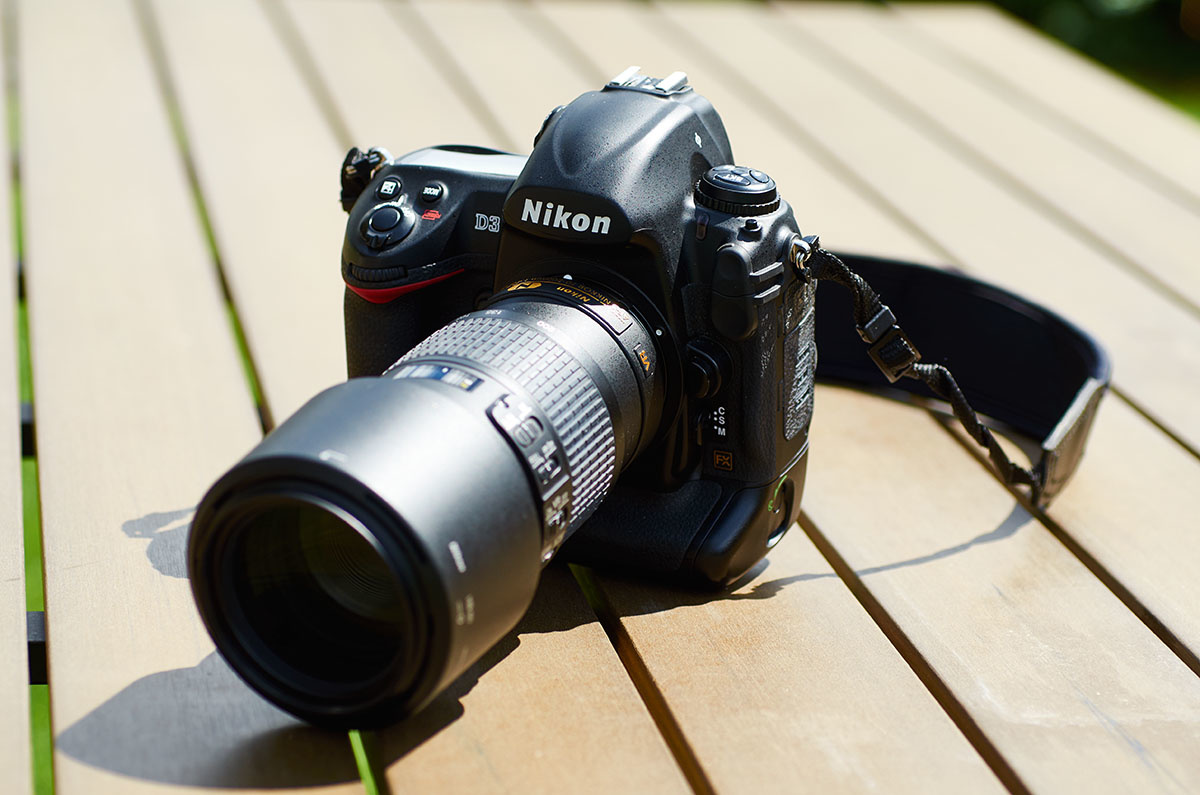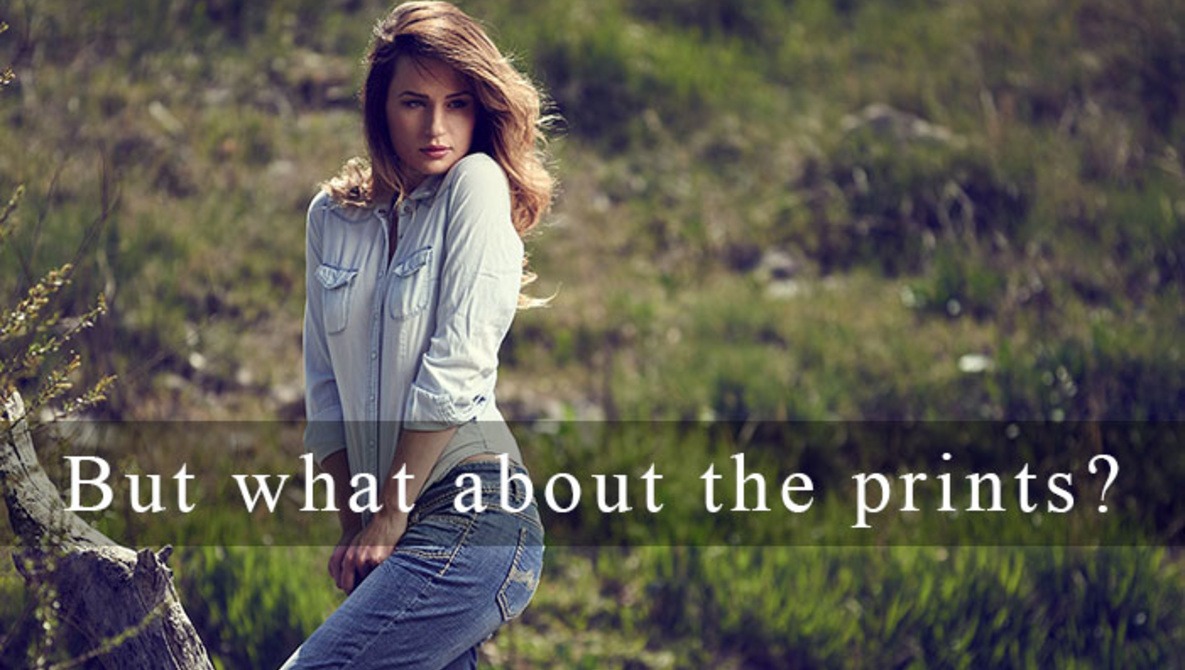A few weeks ago, I wrote an article pitting the venerable Nikon D800 against a lowly Nikon D40x in a portrait shoot. The purpose of the article wasn’t to see if the D40x was as good as the D800 (it obviously isn’t), but to ascertain whether a beginner would be better off getting something cheap to start out with than starting with a behemoth of a camera.
I suspected that for web purposes, the D40x would be more than adequate. I was right. Of course the elephant in the room was, “Wouldn’t the D40x fall apart when it came to comparing prints?” I was truly shocked at the answer.
It was a resounding “meh.”

I printed out the six shots used to compare the cameras at 12"x18" using my printer of choice, ProDPI. I figured at that size I should be able to see the difference. Also, for my needs — magazine covers, headshots, model portfolios, weddings, and engagements — that size would cover 90 percent of my gigs. For the odd blown up wedding portrait, I knew that a 10-megapixel image would stand up just fine.
In a completely unscientific way, I showed the images to about 20 random people. Not one of them could say with certainly which print belonged to which camera. Most got one right, and statistically speaking that was bound to happen. By and large, though, when it came time to make their choices, most people just guessed.
What about an industry professional?
For that I turned to my colleague, Georgia Benjou. Benjou has worked in the fashion industry for almost 20 years, starting as a buyer and merchandiser for Hermes, Dolce & Gabbana, Christian Dior, and Chanel. She’s styled campaigns for Hyde Park Jewelers, The Brown Palace Hotel, and American Crew among others. She’s also the fashion editor for 5280 Magazine, one of the top five city publications in the country. Hundreds of images go through her on a weekly basis. She also receives many, many submissions every month for consideration in the magazine.
She couldn’t tell the difference.
And, here’s the important part: she didn’t care. The images were so close at that size that any difference was insignificant.
So what does this all mean? Get the camera that’s right for your budget. Don’t feel the need to save up for the be-all and end-all of cameras when you’re starting out. It just isn’t needed.
Aftermath

I really was surprised by these results. After all, the D800 was my camera. What should I do about it? I put my money where my mouth is: I sold the D800. I found a used Nikon D3 with low mileage on it, snapped it up, and haven’t looked back. My workflow has sped up, battery life is stupidly good, each file is 85 percent smaller, the camera is ridiculously fast, and I’m not choking trying to keep up with hard drive space. Life is good. If, for whatever reason, I need an ultra high megapixel camera, I’ll rent it. But for my day-to-day shooting, a 12-megapixel workhorse will do me just fine, thank you very much.
Perhaps more people need to evaluate their needs and determine if the camera they're using is really necessary. It wasn’t for me.







I compliment and comment so late in the game. Still, what an immediately intriguing experiment. Keep up the editorial vision.
Still, as others have observed, that dynamic range is a coveted feature all its own... and the reason I'm so loyal to my D800. Here's a peek at my thoughts on it's dyamic range:
http://lifeascinema.blogspot.com/2013/04/helga-in-suburbs.html
The secret's out used equipment is good enough for most shooters!I have recently purchased a used D3 and it was a bargain.I have just started buying used lenses to experiment with from 45 years ago and if handled correctly turn out fine results for most shooters.Some people rquire good equipment for what they do commercially,the rest of us could do with a lot less.
Good read. Thank You! My work horse for every wedding is my Nikon D3s and my backup is D750. Even though the new Nikon D750 has insane auto focus and low light performance. It simply can not provide the speed and usability of the D3s. All my buttons and functions are buttons I can see and press. As a wedding photographer this is key to not missing shots. I love my D750...but needing to press a button and than cycle through what I need....well its just that 1.5 seconds I lost NOT paying attention to the wedding.
I have attached one of my images from last weeks wedding. Nikon D3s
I understand the post completely but... When was the last time you congratulated a chef for his meal and told him that he must have the finest stove and cookware available? Equipment is important but its not the only thing to conduct business.
I did the same thing. I started on the Canon T2i (still use it for 2nd camera at weddings/events), then got another camera as my hotshoe broke off and cost of repairs was cost for another used camera so I got a canon 20D, then the AF motor was on its last legs then I got a Canon XSi which now is my primary 2nd camera for weddings/events and backup for other stuff. Then I felt I needed better AF so I got the Canon 6D. I'm much happier with that, but its not perfect to my style as I tend to shoot on the edges and the camera does lack edge focus points, and since I shoot wide open I cant recompose as I'll lose focus. If anyone asked me what camera I'd recommend to start it would be any DSLR entry level and advise them to keep costs very low to the DSLR than the lens very high. I got my first L lens 2 years after I started, and it was my first huge purchase larger than my kit for my T2i. Never regretted it! Been using my 24-70 2.8L for 3 years without issue and tackt sharp images from the T2i and my other cameras. Do I plan to still get a 5DMK3? But primarily for the focus honestly. I don't plan on getting it though for at least 2-3 years.
Thats all well and good but dont agencies/magazines check the Exif data and wont entertain you unless you use a "Pro" camera..thats just what I heard anyway.
That hasn't been the case in my experience. In every meeting with an art director I've ever had, the subject of gear has never come up. Creatives at magazines just don't usually have time for that sort of thing. I'm sure there are some out there who do have stringent requirements, but getting your foot in the door to even have that conversation is the first step. Magazines are usually up front about their needs. If you're shooting commercial and they need a higher resolution image, just rent a camera.
By the time you are shooting for magazines, you are probably well beyond the "amateur" stage of photography.
Great piece but I can almost hear the thousands of newbies (and many not so newbies), singing LALALALALALA with their hands over their ears. Almost every pro (at least the ones not currently working for a camera manufacturer) has some form of this message in their repertoire and nobody really wants to hear it. That's too bad because it's a very valuable piece of advice. I wish I would have figured it out sooner. I spent years reading camera magazines instead of looking at photography. I spent a lot of time sitting around the house while saving up for my next camera rather than shooting with whatever I had.
I have walked away from photography twice. Both times it was just after buying an expensive camera I had lusted after for months or years. There is nothing like heading out with an expensive new piece of gear and coming home with pretty much the same results you were getting from your old gear.
Thanks, I appreciate it. I'll see what I can do with that article idea. Anyone got a profoto set I can borrow? haha
Maybe someone already mentioned this, but if you have a high mega pixel camera, can't you just shoot in jpeg and choose a lower quality (my A7R has 9mp, 15mp, and 36mp options)? That way the MP's are there when you want them...
oh sure, but why would you shoot in jpg? You lose a lot of the quality that you buy a D800 for...Unless you're shooting 10FPS sports, which the D800 can't do anyway. Kind of like buying a Porche and driving it at 35 most of the time.
People don't get what this article is about!!! We live in a world where bigger is always better ... Well no it isn't ... I have a d4s; d810 (for video mostly) and a D3... My favourite camera remains the D3. Yes it's lack a bit of high tech but hide the badges on the front and take some shots there is not that much between them in good light up to about 3200 them the newer camera comes into its own. Can I taken 90% of the same shots my word... Ppl get hang up with bigger is better that's why the world is so screwed. Top article Hans. Ignore the clowns. Ted
I disagree. A cheap camera will never live up to a professional camera in terms of pixel count and dynamic range and NOISE. You didn't even post the pictures. I bet I can tell them apart. I'm a beginner which you can see by looking at my profile picture (picture was taken with a RebelT2i) and when comparing my raw files with the raw files of, say, Dani Diamond, mine lack contrast and richness. A full frame produces a creamier blur and you obviouslu have access to better and sharper lenses. Maybe the newer cameras are better but my old Rebel is not as good. And MP play a huge role even if you don't sell prints. It catches a lot more detail and when resizing it you can still zoom in all the way and see the eyes clearly. You basically made it sound like getting a professional camera is pointless.